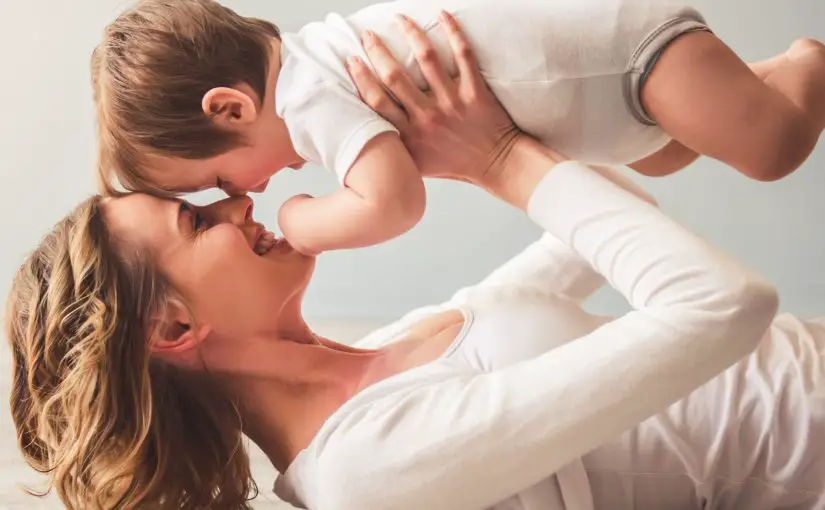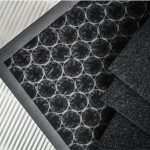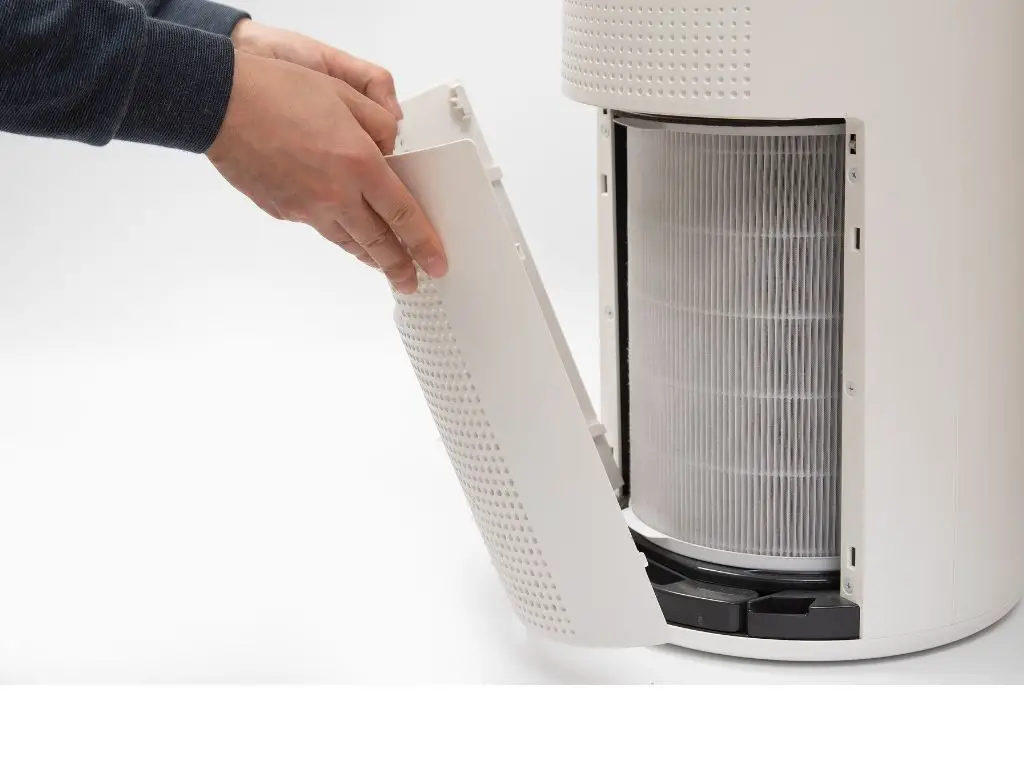Table of Contents
Do HEPA Filters Remove Viruses?
With illnesses like COVID-19 and the flu spreading through the air, many people wonder if using a HEPA filter can help protect them from airborne viruses. HEPA filtration can capture some viral particles, but it should not be relied on as a complete solution. This article will examine how effective HEPA filters are against viruses and what precautions are still needed even when using these specialized filters.
What Are HEPA Filters and How Do They Work?
HEPA stands for “high efficiency particulate air.” To qualify as true HEPA, a filter must remove a minimum of 99.97% of particles that are 0.3 microns in size during testing. This capability makes HEPA filters useful against viruses, but they have limitations.
| Particle Size | Removal Efficiency |
|---|---|
| 0.3 microns | 99.97% |
| 0.1 microns | 99.99% |
HEPA filters capture particles through a combination of techniques:
- Interception – particles following the air flow path collide with filter fibers and stick.
- Impaction – particles too large to avoid fibers get trapped in them.
- Diffusion – smallest particles bounce around and adhere to fibers.
- Electrostatic attraction – filter materials attract and hold particles.
This mesh of dense fibers catches even very tiny particles like viruses as air passes through. Better filters have more uniform fibers to maximize particle capture.
Can HEPA Filters Remove Viruses Like COVID-19 and Flu?
HEPA filters can capture airborne viral particles, including SARS-CoV-2 (the virus causing COVID-19) and influenza. However, viruses present some challenges:
- Small size – Many viruses are smaller than 0.3 microns. HEPA filters are less effective on these tiny particles.
- Aerosol transmission – Viruses can travel in aerosols, remaining airborne longer than larger droplets.
- Infectious dose – It may take only a few virus particles to cause infection and illness.
Despite these difficulties, HEPA filters still significantly reduce airborne viruses. Studies estimate they remove over 99% of virus-containing droplets and particles. Portable HEPA air purifiers can supplement HVAC filters to improve air cleaning throughout a building.
HEPA Filter Limitations Against Viruses
While HEPA filters capture most viral particles, they cannot completely eliminate the risk of airborne transmission:
- Not 100% effective – A small number of viruses can pass through, especially smallest ones.
- Bypass – Unfiltered air can bypass filter if not properly sealed.
- Saturation – Filters get overloaded as particles accumulate.
- Recirculation – Filters do not remove viruses already present in the air.
Additionally, viruses deposited on the filter can remain infectious for hours to days depending on the specific type. Proper handling and disposal is important to avoid transmission from used filters.
| Virus | Survival Time on HEPA Filter |
|---|---|
| SARS-CoV-1 | 72 hours |
| MS2 bacteriophage | 8-12 hours |
Best Practices for HEPA Filtration Against Viruses
While HEPA filters have limitations, they remain a useful part of a complete infection control strategy when implemented properly:
- Right filter ratings – Choose true HEPA rated filters, which are 99.97% efficient at 0.3 microns.
- Combined ventilation – Supplement with outdoor air intake and exhaust ventilation.
- Portable purifiers – Use HEPA purifiers to boost filtration in high-risk areas.
- Monitor performance – Check differential pressure across filter to detect any damage or leaks.
- Change filters – Replace per manufacturer instructions, typically every 6-12 months.
- Proper installation – Ensure tight filter fit to prevent bypass leakage.
- Control humidity – Keep relative humidity below 65% to avoid viral particle aggregation.
In critical spaces like hospitals, the highest-rated HEPA filters along with supplemental disinfection techniques are recommended. Commercial buildings should consult HVAC professionals on selecting appropriate filtration levels.
Other Precautions to Take with HEPA Filtration
HEPA filters reduce airborne viruses, but cannot entirely prevent transmission on their own. Even venues using HEPA filters need additional precautions like:
- Face masks – Wear tight-fitting masks like N95s, KN95s, or KF94s.
- Social distancing – Keep at least 6 feet between people.
- Occupancy limits – Reduce density in indoor spaces.
- Ventilation – Bring in outdoor air; avoid stagnant recirculation.
- Surface cleaning – Disinfect high-touch surfaces frequently.
- Hand hygiene – Wash hands thoroughly and often.
- Respiratory etiquette – Cover coughs and sneezes.
A “Swiss cheese” model with layered interventions will reduce overall transmission risks more than any single measure alone. HEPA filters serve as an important component when combined with additional evidence-based precautions.
 Conclusion
Conclusion
HEPA filtration can capture most airborne viruses in a space, lowering infection risk. However, it has limitations and should not be the sole protective measure. True HEPA filters, properly installed and maintained, remain useful as part of a multifaceted infection control approach. Supplementing with portable purifiers, adequate ventilation, and other hygiene practices is key for protecting public health against illnesses like COVID-19 or influenza.
Here is a 7 question FAQ added to the end of the article:
Frequently Asked Questions
Q: How small of particles can HEPA filters remove?
A: HEPA filters are rated to remove 99.97% of particles sized 0.3 microns. Even smaller particles down to 0.1 microns are captured at 99.99% efficiency or higher.
Q: Can HEPA filters protect against COVID-19?
A: Yes, HEPA filters effectively capture the SARS-CoV-2 virus particles that cause COVID-19. They greatly reduce transmission risks.
Q: Are HEPA filters 100% effective against viruses?
A: No. While HEPA filtration removes over 99% of viral particles, it cannot completely eliminate the risk of airborne transmission on its own.
Q: How often should you change a HEPA filter?
A: Replace HEPA filters based on manufacturer recommendations, typically every 6-12 months. Check pressure readings across the filter to monitor when changeout is needed.
Q: Can HEPA filters trap viruses and then release them later?
A: Viruses trapped on the filter can remain infectious for hours to days depending on the specific type. Proper PPE and handling is important when changing used filters.
Q: Are portable HEPA purifiers or in-duct HVAC filters better?
A: Built-in HVAC filters clean the overall space air. Portable purifiers supplement them by providing intensive filtration in high-risk areas. Using both together gives the best results.
Q: What other steps help reduce viral transmission?
A: Wear tight-fitting masks, keep distance, improve ventilation, use disinfection, wash hands frequently, and cover coughs/sneezes. A layered defense is most effective.
source








